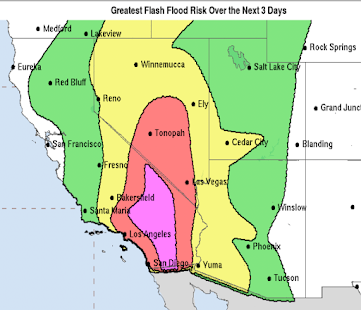How Well Are the IPCC's Temperature Forecasts Working Out? Poorly!
UPDATE: Thanks to commenter Lolwot at Judy's blog, learned I made a mistake. The correct value is not 0.00 but 0.15°C. That does not change the premise of this posting because it is still outside of the 95% confidence interval indicating a poor forecast. As a matter of policy, we don't erase mistakes on the blog.
ORIGINAL POSTING:
Over at climate scientist Judy Curry's blog, there is a discussion about the pause in global warming. Some of the commenters were curious at how well past Intergovernmental Panel on Climate Change's forecasts have worked out. The answer is very poorly.
Here is an example from their 2001 Report:
This figure shows the forecast range of temperatures from 1990 even though the report was issued in 2001. By comparing temperatures back to 1990, the IPCC set a very low bar for itself. Why? The period from 1992 to 1998 was a period when temperatures rapidly rose. I'm sure it seemed inconceivable as the 2001 report was being prepared that temperatures would cool. Yet, they did. World temperatures, as measured by the HADCRUT data (the same index as used by the IPCC), shows temperatures peaked in 1998 and have been flat to down since.
You can see that temperatures in 1990 are approximately the same as the last twelve months'. So, relative to 1990, there has been no change. I've plotted the "no change" for 2013 on the upper graph with a green dot and highlighted it with an arrow. So, even against this very low bar, the forecast failed. It falls outside of the 95% confidence level on the cold side.
If you look at temperatures for 2012, they are outside of the forecast range as are 2011's, all on the cold side.
I did the same thing for their 2004 forecasts with the same result. Temperatures outside of the 95% confidence interval on the cold side.
While it is important to note the IPCC does not have skill at forecasting future temperatures, that is not the main takeaway. The main takeaway,
Global warming advocates will undoubtedly accuse me of "cherrypicking" -- choosing dates so as to make my point. But, these are not my dates, they are the dates chosen by the IPCC for their forecast. While ocean heat content is actually the more important metric, this is the metric the IPCC chose to emphasize.
It is long past time for climate science to own up to this: If climate science cannot make an accurate 20 year forecast, there is absolutely no reason to believe their forecasts for 40 or 60 years would be any better.
It also calls into serious question the entire notion that human beings are causing (present tense) catastrophic global warming. It also appears earth's climate is less sensitive to carbon dioxide than has been thought.
ORIGINAL POSTING:
Over at climate scientist Judy Curry's blog, there is a discussion about the pause in global warming. Some of the commenters were curious at how well past Intergovernmental Panel on Climate Change's forecasts have worked out. The answer is very poorly.
Here is an example from their 2001 Report:
 |
| click to enlarge |
You can see that temperatures in 1990 are approximately the same as the last twelve months'. So, relative to 1990, there has been no change. I've plotted the "no change" for 2013 on the upper graph with a green dot and highlighted it with an arrow. So, even against this very low bar, the forecast failed. It falls outside of the 95% confidence level on the cold side.
If you look at temperatures for 2012, they are outside of the forecast range as are 2011's, all on the cold side.
I did the same thing for their 2004 forecasts with the same result. Temperatures outside of the 95% confidence interval on the cold side.
While it is important to note the IPCC does not have skill at forecasting future temperatures, that is not the main takeaway. The main takeaway,
Earth's temperatures, as measured by HADCRUT, are approximately the same in 2013 as
they were in 1990, an interval of 23 years without net warming!
Global warming advocates will undoubtedly accuse me of "cherrypicking" -- choosing dates so as to make my point. But, these are not my dates, they are the dates chosen by the IPCC for their forecast. While ocean heat content is actually the more important metric, this is the metric the IPCC chose to emphasize.
It is long past time for climate science to own up to this: If climate science cannot make an accurate 20 year forecast, there is absolutely no reason to believe their forecasts for 40 or 60 years would be any better.
It also calls into serious question the entire notion that human beings are causing (present tense) catastrophic global warming. It also appears earth's climate is less sensitive to carbon dioxide than has been thought.





Comments
Post a Comment